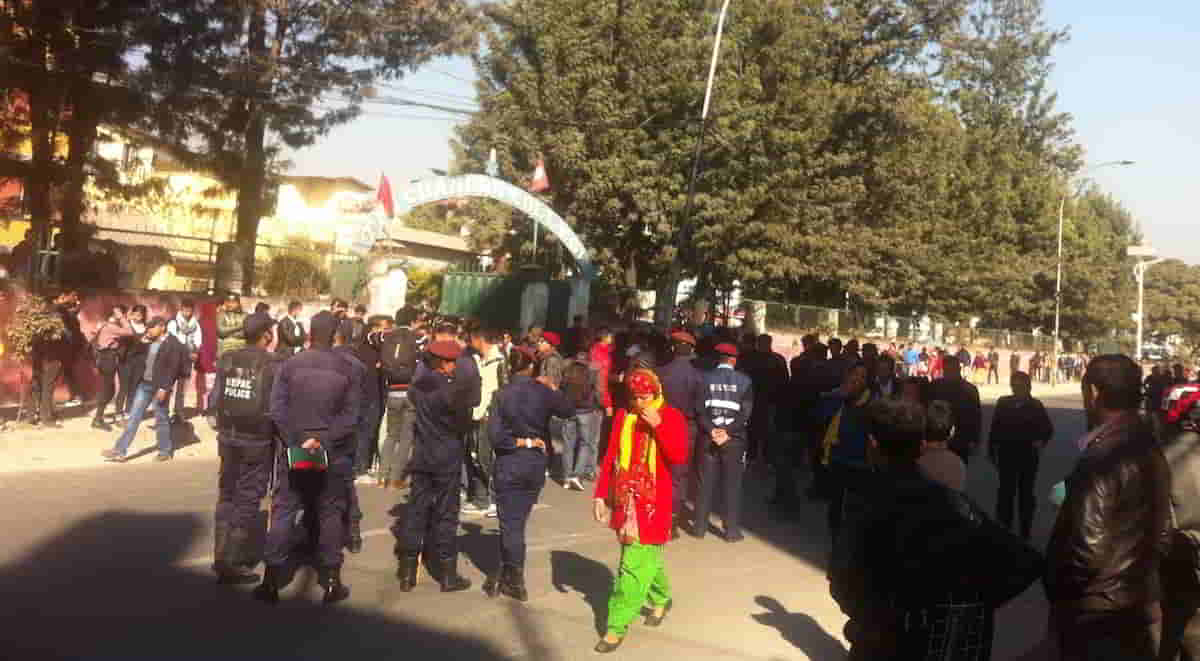
Politics rules public institutions of higher education in Nepal. Consequently, education loses out and, in turn, the people and the country!
That was the case before 1990 when the democratic form of government was instituted after the first people’s revolution. I even had a brief experience with it in the spring of 1988, when I attended Amrit Science College, a public College in Kathmandu, before I left for the United World College of the Adriatic in Italy.
Almost thirty years on, not much appears to have changed.
The recent round of political activities at Tri-Chandra College started last month, on December 8, not long after the constitution amendment bill was tabled! The police including Armed Police Force (APF) were out in force outside the gates (see image above) and around the perimeter of the college campus in Jamal and Durbar Marg, the main street leading to the college from the former royal palace. Traffic from Jamal and on Durbar Marg were diverted elsewhere.
The students at the college were preparing themselves for an agitation in response, I assumed, to the action UML, one of the three biggest political parties, had called for in opposition to the amendment bill. I didn’t stick around for long. Just long enough to take some shots.
Bigger rallies and agitations followed the tabling of the bill, such as in Butwal on December 12, when, according to this article in Setopati, thousands marched protesting against it!
On the same day, the Prime-Minister-in-Waiting — yes, you read that right, Prime-Minister-in-Waiting — Sher Bahadur Deuba, the leader of Nepali Congress, another one of the three biggest political parties in the country and a coalition partner in the government, came to a rally organized also at the College. (When CPN-UML and Nepali Congress recently brought down the disastrous UML government, headed by KP Oli, the agreement between the two was that Puspa Kamal Dahal would be Prime Minister first, for nine months or so, followed by Deuba.)
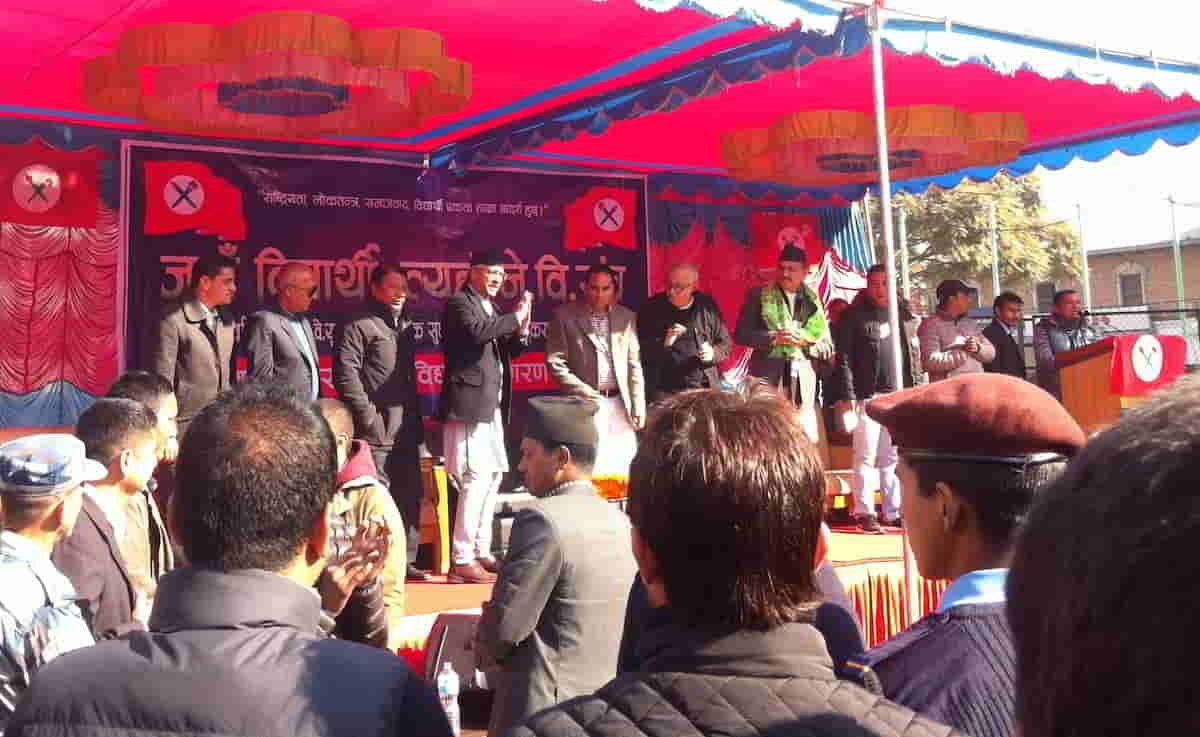
He walked in with a small entourage and took his seat next to a group of, I assumed, other political leaders.
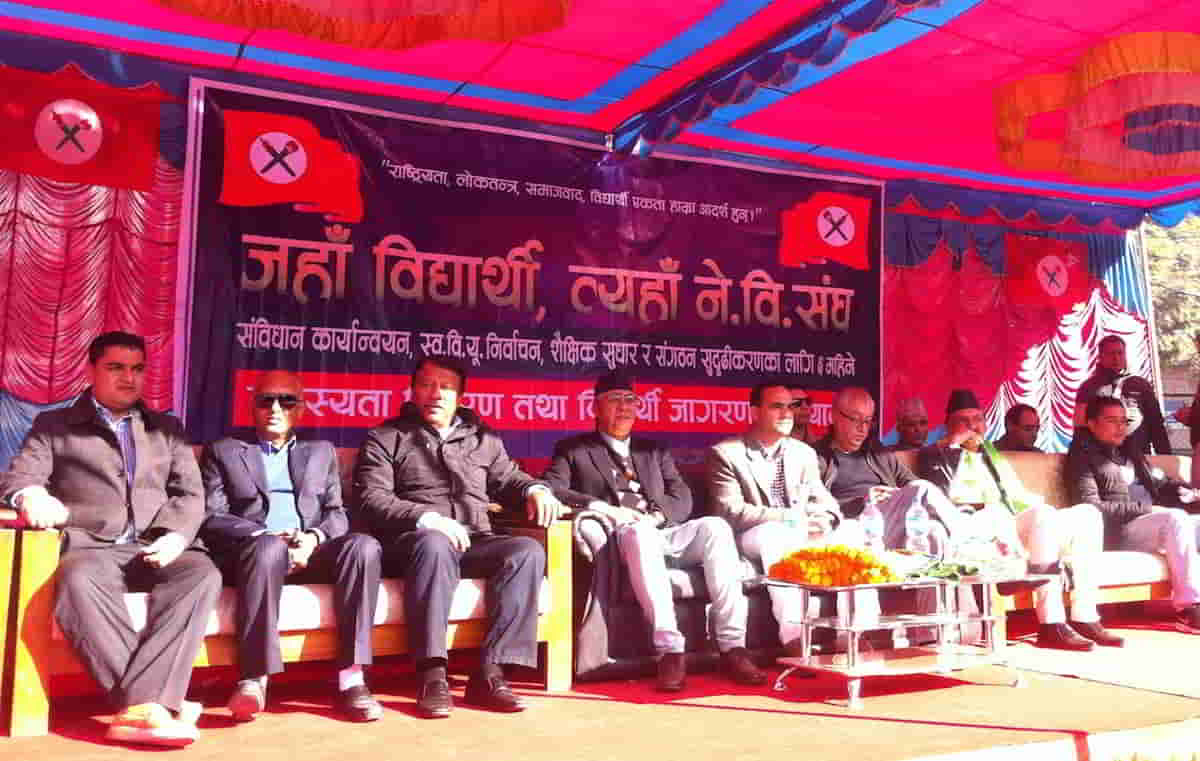
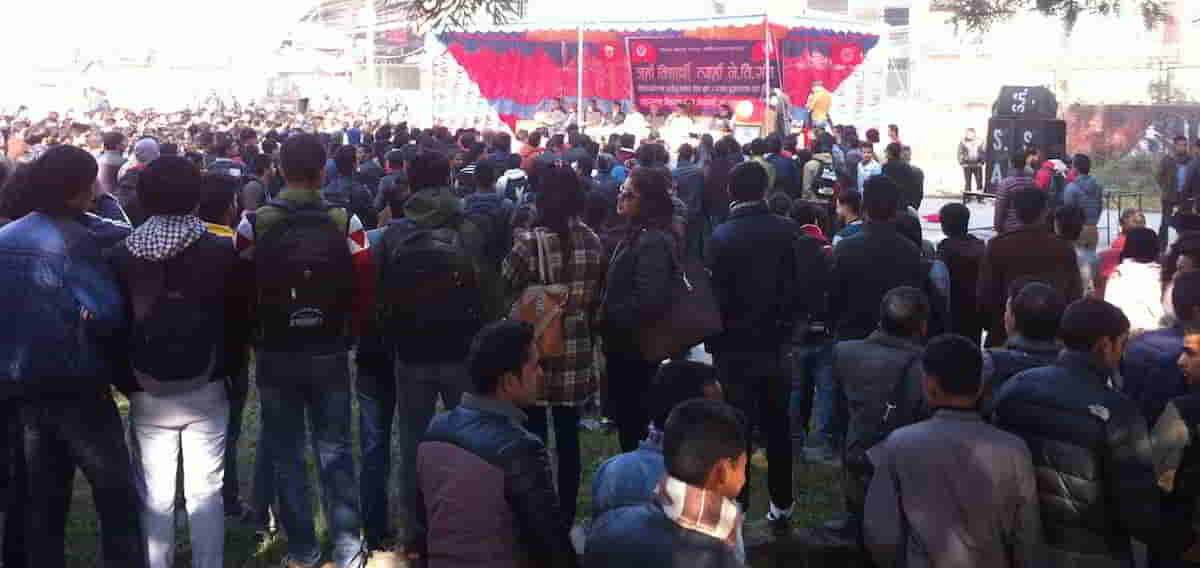
Tri-Chandra, incidentally, is the same college where some personal issues between two student union leaders, belonging to different political parties, lead to the burning down of the college library in 2014. Yes, pretty much the entire college library!
On December 28, the rally was indoors (see image below). The flag is that of Nepali Congress.
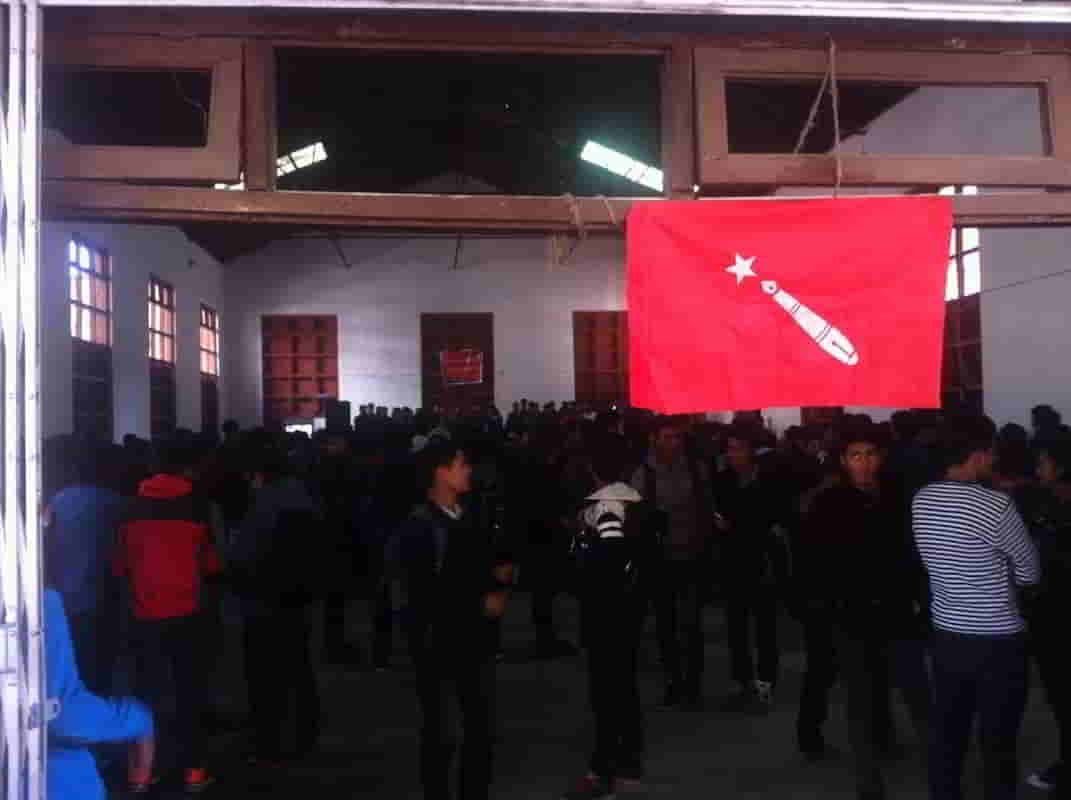
On January 6, in response to another call by UML, Tri-Chandra College student were preparing themselves to go out for a rally around the city.
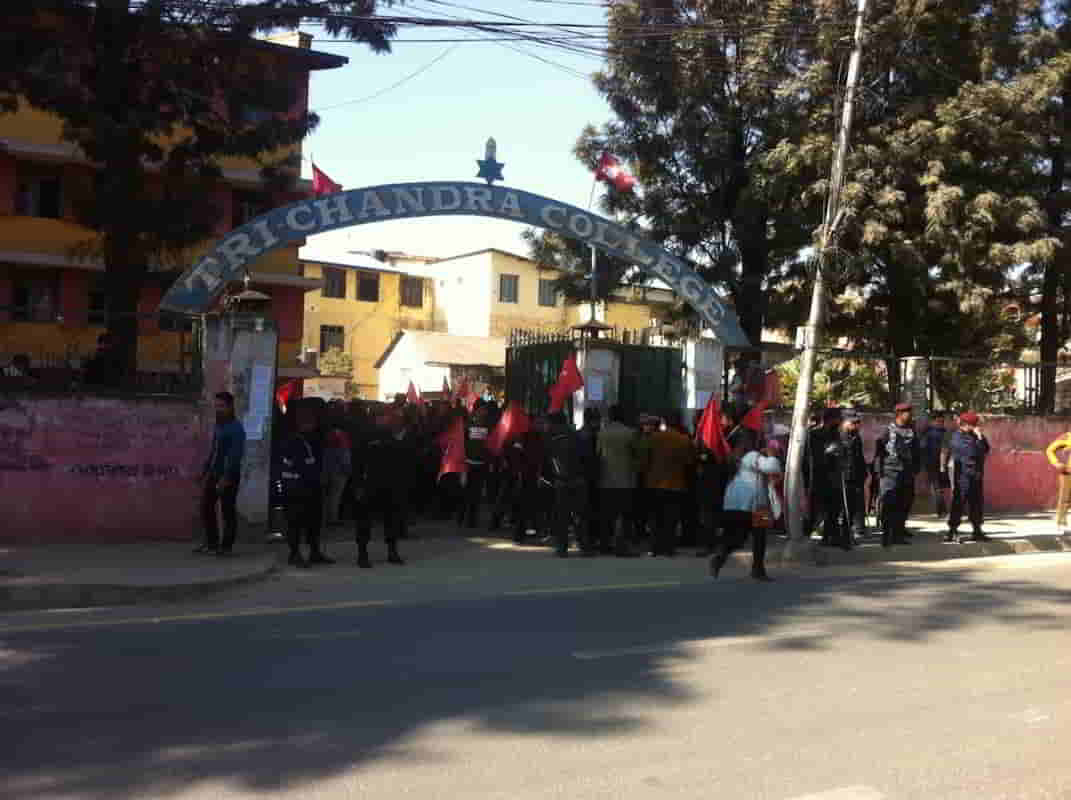
Those were but just a sample of political activities that I personally observed at Tri-Chandra College over almost a month. (I am pretty sure similar activities were going on in pretty much every other public institution of higher education.)
If the banner with details of their programs is to be believed — and I have no reason NOT to — what I witnessed was only part of a six-month long program!
What’s more, it’s been rare for a week to pass without a political rally of one kind or another at Tri-Chandra college ever since I started working at COMMITTED, whose office is near the college.
At institutions of higher education I attended in Italy, USA, UK and Australia, such level of man-made — yes MAN-made — disruptions to education would be unthinkable!
In Nepal however, for a long time, the only option for post-secondary and tertiary education had been public schools, essentially black holes because more politicking than learning took place. Starting in 1988, private post-secondary as well as tertiary educational institutions were introduced in urban centers (which, however, in many ways are more of a business than anything). But, still, for most high school graduates in the country, public institutions of higher education characterized by such disruptions are, sadly, just part and parcel of “further education” because private education for them is out of reach.
Children in rural parts of the country go to great lengths to get primary and secondary education, such as crossing rivers everyday on Tuins. Student at institutions of higher education, such as Tri-Chandra College, on the other hand, encouraged and supported by political leaders, use such institutions as a playground for politics.
Is it any wonder then that the level of tertiary level educational qualifications of the population is so low (see below)?!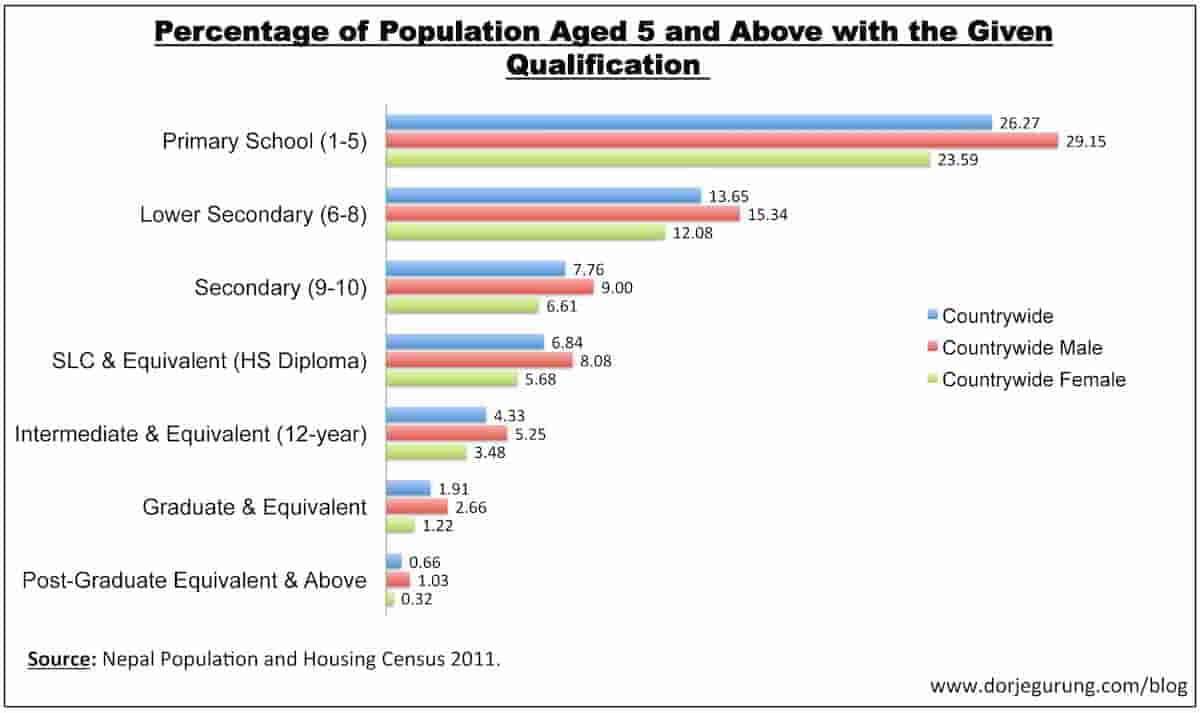
Is it any wonder then that the average number of years of formal education for the country was just 2 years in 1990 and, after almost a generation had come through, in 2013, it was just 3.2 years?!
We are behind every single one of our South Asian neighbors except Bhutan!
Is it any wonder then that so many Nepalese so easily fall victim to propaganda and behave like sheep, unable to think for themselves?!
Is it any wonder then that the two biggest universities in the country are intellectually bankrupt?!
Is it any wonder then that we struggle to make significant social, economic and political progress?!
When formal education, which benefits ALL the people and therefore the country, takes a backseat to our very peculiar brand of politics, which benefits only a small groups of people, mostly hill so-called high caste Hindu men, the most structurally privileged demographics in the country (click here, here, here and here for more), naturally the country keeps crashing at every turn…as it always has.
What do you think?
* * * * * * * *
Relevant References (added after the publication of the post):
The following are links to articles detailing a couple of the issues with the politicization of institution of further education, notably disruption to education and violence on campus.
The Himalayan Times (March, 2017): Campus politics: The way ahead. Writing about the upcoming Student Union elections at TU-affiliated colleges, Jeewan Shrestha, an Engineering graduate from Pulchok Campus, a TU-affiliated college, writes, describing the problem with politicized institutions of tertiary education:
The purpose of this election is meant to bring out a team of students that can and should work for the benefit of the students. However, based on experience, I am not very optimistic that the Students’ Union to be formed, if at all, will be able to fulfill this.
The simple reason for this is the involvement of the politicized student bodies who are mainly accountable to their mother parties instead of the students. They put their parties’ interest as a priority rather than the priorities of the students or the campus, for that matter.
Some 12 years ago, when I was an engineering student at Pulchowk Campus, I witnessed a FSU election. There were NSU, ANNFSU and other student bodies campaigning with their agendas. We used to get free lunch coupons from each of these bodies, which we of course enjoyed.
This was despite the fact that we did not care what agendas they put forward as we knew they were meant to do politics in the name of students and not to perform for the benefit of students. We were not interested in those elections as we saw only the political parties behind the student bodies.
He proposes:
A Campus Council is the alternative that ensures the interests of the campus and its students. This council will consist of students, teachers, employees and parents too. They will work to improve the academic atmosphere, train the students to cope with the relevant demands of the time, link the academics to industry, collaborating with excellent institutions etc., to name just a few.
Apart from disrupting education, politics on College Campuses lead to violence on campus!
Political-party affiliated college students clash. Sustain injuries. If only they were so passionate abt education! https://t.co/nk7wPL0X90
— Dorje Gurung (@Dorje_sDooing) February 27, 2017
English version of the same report. #Nepal https://t.co/0b4qXGOP2X
— Dorje Gurung (@Dorje_sDooing) February 27, 2017
Disruptions to education etc. at another college in d lead up to election of “student” leaders of student unions! https://t.co/tWPMdyYCku
— Dorje Gurung (@Dorje_sDooing) March 1, 2017
Politicking in College Campuses in KTM. A college store burnt down. A couple of yrs ago it was d library at TC. https://t.co/FGdzx5mTWR
— Dorje Gurung (@Dorje_sDooing) February 26, 2017
The Kathmandu Post (July 2014). Tri-Chandra library turns to ashes. “According to police, the fire broke out immediately after a group of NSU cadres led by Kamal Budha attacked Prem KC, a member of the ANNFSU TC Campus Chapter, with khukuri.” In other words, the burning of the library directly or indirectly involved student involved in politics!
MyRepublica (March 2018). TU is dead. TU is Tribhuvan University, the country’s oldest university. “Our university has degenerated into an intellectually dead institution. If it had been kept away from baneful politics, it would not have been so.”[…]”Critical thinking is a key to intellectual growth of a university. Only professors inclined to critical thinking are capable of propounding new theories. It is very difficult to find such professors at TU. Mostly TU professors are either disinclined to think critically or incapable of doing so. Blatant political interference has turned the exam conducted by TU Service Commission into a charade. As a result, those who do not deserve to be a professor become professors.” [Added on March 6, 2018.]
My Republica (Feb. 28, 2017). Vital FSU election. “The main task of new student leaders will be to save public education at a time of rampant privatization.” […] “[A] smaller but feistier cousin of the local poll, the election of the Free Student’s Union (FSU), is also all set to make a comeback after eight years. And it is being held at a time the country’s political transition is in its last legs. The last student election happened when the country was still trying to regain its bearings after the euphoria of Maoists’ triumph in the first Constituent Assembly elections in 2008.” [Added Oct. 30, 2018.]
The Kathmandu Post (Jan. 25, 2020). How politicisation is dragging Kathmandu University down. On a side note, this is NOT to say that I am against labor unions. I whole-heartedly support unions. Just not unions tied to political parties, which appears to be the case with every single union in Nepal. It’s NOT clear whether the unions striking at KU have political affiliations. [Added on Jan. 25, 2020.]
